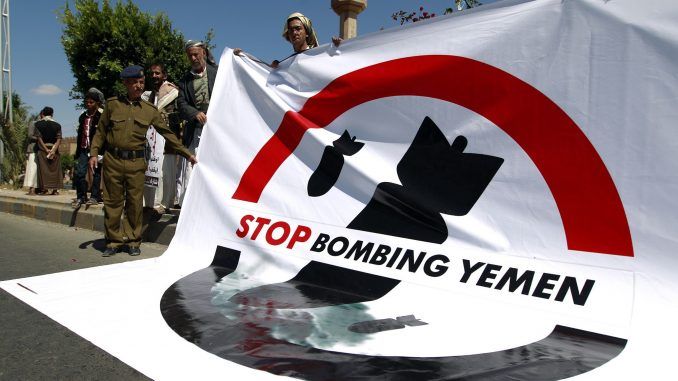
Demonstration on Saturday June 13: 1:00 – 2:00 pm
South Bay Shopping Center in Dorchester, Massachusetts
America Is Not a “Battlespace” and Yemen Shouldn’t Be Either
Paul Shannon / Raytheon Antiwar Campaign & Massachusetts Peace Action
WASHINGTON, DC (June 11, 2020) — “I think the sooner that you mass and dominate the battlespace, the quicker this dissipates and we can get back to the right normal.”
These are the words of Raytheon’s Man at the Pentagon, Mark Esper, our current Secretary of Defense and a former top lobbyist for Raytheon. These words are taken from a leaked call. After receiving widespread criticism, including from one of his predecessors General Jim Mattis, Esper publicly took a step back. But make no mistake, this is how Raytheon’s top man in Washington DC talks about his fellow citizens in private.
Americans protesting against police brutality are getting a taste of what it’s like to live in a “battlespace.” The people of Yemen have been enduring famine and war for over 5 years. Over 10 million people are living on the brink of famine. Over a million cases of cholera have been reported. At least 85,000 children under the age of 5 have died as a result of this war.
Raytheon’s close connections with the Trump Administration and the war in Yemen were fully revealed in a 3-full-page expose in the New York Times. [See story below — EAW] The influence of the military industrial complex is in full view. The latest is that Trump is about to grant Raytheon a license to expand its bomb factory in Saudi Arabia (New York Times, June 11, 2020).
Join us this Saturday, June 13th from 1:00 to 2:00 pm at the South Bay Shopping Center in Dorchester (the Target entrance at the corner of Southampton St. and Allstate Rd.). Help us spread the word about Raytheon’s continued partnership with Saudi Arabia in the destruction of Yemen, even in the midst of a global pandemic.
Sponsored by the Raytheon Anti-war Campaign — info@masspeaceaction.org

Bombs built by Raytheon in Arizona killed 31 civilians in a village in Yemen.
Why Bombs Made in America Have Been Killing Civilians in Yemen
(May 18, 2020) — Year after year, the bombs fell — on wedding tents, funeral halls, fishing boats and a school bus, killing thousands of civilians and helping turn Yemen into the world’s worst humanitarian crisis.
Weapons supplied by American companies, approved by American officials, allowed Saudi Arabia to pursue the reckless campaign. But in June 2017, an influential Republican senator decided to cut them off, by withholding approval for new sales. It was a moment that might have stopped the slaughter.
Not under President Trump.
With billions at stake, one of the president’s favored aides, the combative trade adviser Peter Navarro, made it his mission to reverse the senator. Mr. Navarro, after consulting with American arms makers, wrote a memo to Jared Kushner and other top White House officials calling for an intervention, possibly by Mr. Trump himself. He titled it “Trump Mideast arms sales deal in extreme jeopardy, job losses imminent.”
Within weeks, the Saudis were once again free to buy American weapons.

Fragment from deadly Raytheon bomb dropped on a wedding party in Yemen.
The intervention, which has not been previously reported, underscores a fundamental change in American foreign policy under Trump that often elevates economic considerations over other ones. Where foreign arms sales in the past were mostly offered and withheld to achieve diplomatic goals, the Trump administration pursues them mainly for the profits they generate and the jobs they create, with little regard for how the weapons are used.
Trump has tapped Navarro, a California economist best known for polemics against China, to be a conduit between the Oval Office and defence firms. His administration has also rewritten the rules for arms exports, speeding weapon sales to foreign militaries. The State Department, responsible for licensing arms deals, now is charged with more aggressively promoting them.
“This White House has been more open to defence industry executives than any other in living memory,” said Loren B Thompson, a longtime analyst who consults for major arms manufacturers.
No foreign entanglement has revealed the trade-offs of this policy more than the war in Yemen. There, Trump’s embrace of arms sales has helped prolong a conflict that has killed more than 100,000 people in the Arab world’s poorest nation, further destabilizing an already volatile region, according to a review of thousands of pages of records and interviews with more than 50 people with knowledge of the policy or who participated in the decision-making.
American arms makers who sell to the Saudis say they are accountable to shareholders and are doing nothing wrong. And because weapon sales to foreign militaries must be approved by the State Department, the companies say they don’t make policy, only follow it.

But as the situation in Yemen worsened, at least one firm, Raytheon Co, did more than wait for decisions by US officials. It went to great lengths to influence them, even after members of Congress tried to upend sales to Saudi Arabia on humanitarian grounds.
Raytheon, a major supplier of weapons to the Saudis, including some implicated by human rights groups in the deaths of Yemeni civilians, has long viewed the kingdom as one of its most important foreign customers.
After the Yemen war began in 2015 and the Obama administration made a hasty decision to back the Saudis, Raytheon booked more than $3 billion in new bomb sales, according to an analysis of available US government records.
Intent on pushing the deals through, Raytheon followed the industry playbook: It took advantage of federal loopholes by sending former State Department officials, who were not required to be registered as lobbyists, to press their former colleagues to approve the sales.
Posted in accordance with Title 17, Section 107, US Code, for noncommercial, educational purposes.